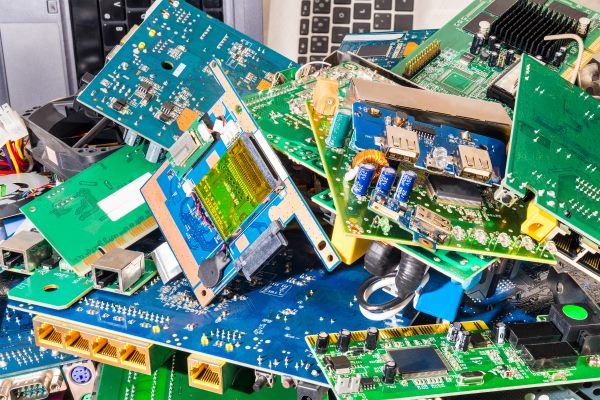
The banking and financial services sector is one of the most technology-dependent industries in the world. With millions of customers relying on online banking, mobile payments, and digital transactions, financial institutions must maintain a vast network of IT infrastructure to support their operations. This includes servers, computers, laptops, mobile devices, and other electronic equipment that store sensitive customer data and facilitate transactions.
As technology advances and devices become obsolete, responsible IT disposal becomes a critical concern. Improper disposal of IT assets can lead to data breaches, environmental harm, and reputational damage. This is where Recycling Your IT comes in – a trusted partner in responsible IT disposal, dedicated to helping financial institutions securely and sustainably dispose of their IT assets, protecting their customers’ data and the environment.
The Risks of Improper IT Disposal
Improper IT disposal poses significant risks to financial institutions in the UK. Firstly, improperly disposed IT assets can lead to data breaches and cybersecurity threats. Sensitive customer data, such as financial information and personal identifiable information, can be compromised if devices are not properly wiped or destroyed. This can result in identity theft, financial fraud, and reputational damage. Furthermore, financial institutions must comply with stringent regulations, including the General Data Protection Regulation (GDPR) and the Payment Card Industry Data Security Standard (PCI-DSS).
Failure to comply with these regulations can result in significant fines and penalties. Additionally, improper IT disposal contributes to the growing problem of electronic waste (e-waste) and pollution, harming the environment and local communities. Finally, the reputational damage caused by improper IT disposal can lead to a loss of customer trust and confidence, ultimately affecting the bottom line of financial institutions.
The Consequences of Non-Compliance
 The consequences of non-compliance with IT disposal regulations can be severe and far-reaching. Financial institutions that fail to comply with regulations such as GDPR and PCI-DSS can face significant fines and penalties, which can run into millions of pounds.
The consequences of non-compliance with IT disposal regulations can be severe and far-reaching. Financial institutions that fail to comply with regulations such as GDPR and PCI-DSS can face significant fines and penalties, which can run into millions of pounds.
Customers are increasingly aware of the importance of data protection and environmental responsibility and will take their business elsewhere if they perceive a financial institution to be negligent in these areas. Furthermore, the environmental harm caused by improper IT disposal can harm local communities, leading to further reputational damage and potential legal action. Ultimately, non-compliance can have a devastating impact on a financial institution’s bottom line and long-term viability.
The Benefits of Responsible IT Disposal
Responsible IT disposal offers numerous benefits to financial institutions. Firstly, it ensures the protection of sensitive customer data and prevents data breaches, which can lead to identity theft, financial fraud, and reputational damage. By securely wiping and destroying devices, financial institutions can prevent unauthorised access to confidential information. Additionally, responsible IT disposal ensures compliance with regulations such as GDPR and PCI-DSS, avoiding fines and penalties that can run into millions of pounds.
Furthermore, responsible IT disposal has significant environmental benefits, reducing the amount of electronic waste (e-waste) and pollution that can harm local communities. By adopting responsible IT disposal practices, financial institutions can enhance their reputation and build customer trust, which can lead to increased customer loyalty and retention. Finally, responsible IT disposal can also generate cost savings through the recycling and reuse of IT assets, reducing the need for new equipment and minimising waste.
Best Practices for Responsible IT Disposal
 To ensure responsible IT disposal, financial institutions should adopt best practices that prioritise security, sustainability, and compliance. Firstly, partnering with a trusted IT disposal provider like Recycling Your IT can provide financial institutions with the expertise and resources needed to dispose of IT assets securely and sustainably.
To ensure responsible IT disposal, financial institutions should adopt best practices that prioritise security, sustainability, and compliance. Firstly, partnering with a trusted IT disposal provider like Recycling Your IT can provide financial institutions with the expertise and resources needed to dispose of IT assets securely and sustainably.
Implementing a secure and trackable disposal process is also crucial, ensuring that devices are wiped and destroyed under industry standards and regulations. This can include using certified data destruction methods, such as shredding or degaussing, and providing detailed reporting and certification of the disposal process.
Furthermore, recycling, and reusing IT assets whenever possible can help reduce electronic waste and minimise the environmental impact of IT disposal. By adopting these best practices, financial institutions can ensure that their IT disposal processes are secure, sustainable, and compliant with regulations, while also reducing costs and enhancing their reputation.
In summary, responsible IT disposal is crucial in the banking and financial services sector to protect sensitive customer data, comply with regulations, and minimise environmental harm. Financial institutions must prioritise secure and sustainable IT disposal practices to avoid reputational damage, fines, and penalties. By partnering with Recycling Your IT, financial institutions can ensure that their IT assets are disposed of in a secure, trackable, and environmentally responsible manner. By doing so, they can protect their customers’ data, reduce their environmental footprint, and maintain a positive reputation. Don’t risk your customers’ trust and your institution’s reputation – partner with Recycling Your IT for secure and responsible IT disposal today.
To explore all the services we offer and find the right recycling solution for your needs, visit our Areas Sitemap page for a comprehensive overview.
